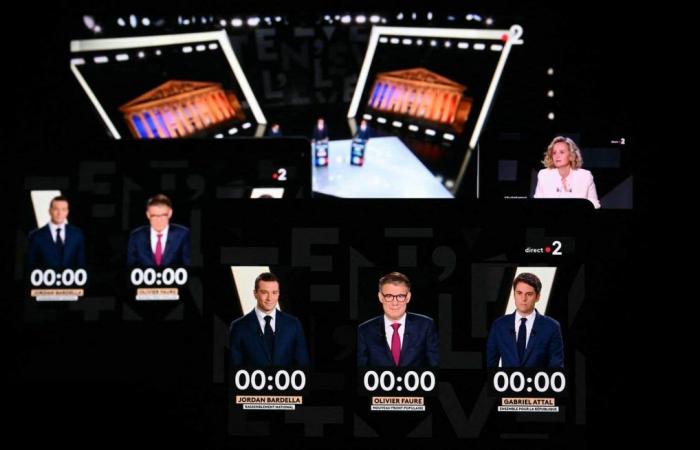Purchasing power, immigration, international affairs, pensions, education: here is a comparison of the programs of the main forces competing in the French legislative elections: the National Rally (RN, far right), the favorite in the polls, the left-wing alliance of the New Popular Front and President Macron’s camp.
Purchasing power
The number one concern of the French according to recent surveys, purchasing power is at the heart of the projects of the three main blocs. The RN thus promises to reduce VAT on energy products from 20 to 5.5%. And secondly to “suspend” VAT on around a hundred essential products, “in the event of high inflation”.
The left is pushing a flagship economic measure: a minimum wage of 1,600 euros net compared to almost 1,400 today. It also wants to index salaries to inflation and increase civil servants’ salaries.
To finance this costly project for public finances, the left alliance intends to reestablish a solidarity tax on wealth (ISF) reinforced with a “climate component”, “generalize” the taxation of superprofits and create an additional contribution on high salaries .
If the left intends to “refuse the European budgetary stability pact”, which notably imposes a public deficit below 3% of GDP, the outgoing Macronist majority is committed to respecting this directive by 2027 (compared to 5, 5% in 2023) without increasing taxes.
It also wants to allow companies to increase the amount of a purchasing power bonus called the “Macron bonus”, created in 2018 in the wake of the Yellow Vest movement, by up to 10,000 euros per year without charges or taxes.
Immigration
The left intends to repeal the immigration law adopted this winter in Parliament, to enshrine “full right of the soil” or even to create “a status for climate displaced persons”.
In the antipodes, the RN promises a new “emergency” immigration law from 2024. Its proposals: removal of land law, tightening of family reunification criteria, offense of illegal stay with a fine, and transformation of medical aid for State for “vital emergency aid” for foreigners in an irregular situation.
The far-right party also says it wants to ban certain “sensitive jobs” for dual nationals, without calling into question “dual nationality” as it was still proposing in 2022.
International
France’s foreign policy is traditionally seen as a presidential prerogative, but the left and far right have both unveiled several proposals.
The left-wing parties tried to overcome their deep differences by denouncing in their program the “terrorist massacres” of Hamas, while promising to fight against the “disturbing explosion” of “racist, anti-Semitic and Islamophobic acts”.
They advocate the immediate recognition of the State of Palestine, unlike the RN whose president, Jordan Bardella, believes that such an initiative today would amount to “recognizing terrorism”.
The latter also assured that he did not intend to “call into question France’s international commitments” if he becomes prime minister. Marine Le Pen still promised in 2022 to leave NATO’s integrated command.
The RN president also assured that he would be “extremely vigilant” in the face of “attempts at interference by Russia”, while setting “red lines” on the sending of ground troops to Ukraine or “long-range missiles or military equipment” which could “directly strike Russian cities”.
Announcements which collide with those of Emmanuel Macron, agreeing to allow Ukraine to use Western weapons to “neutralize” Russian military bases.
At the end of the campaign, Marine Le Pen stated that the role of “head of the armed forces” of the President of the Republic was merely an “honorary title”, suggesting a tense cohabitation with the French President in the event of a victory by the RN.
Pensions and health
Both the far right and the left alliance are proposing, in the event of victory on July 7, to eliminate the unemployment insurance reform decided by the government, which tightens the eligibility conditions and reduces the duration of compensation.
Another much-criticized reform is that of pensions, which pushed back the retirement age by two years, to 64, raising strong popular and parliamentary protest, which both opposition blocs want to reverse. The left proposes to repeal it and aims for a “common objective”: the right to retire at 60.
Jordan Bardella made contradictory remarks on the subject, claiming to want to establish a legal retirement age of 62 while establishing a “progressive” system favoring long careers, with the possibility of leaving at 60 for those who started working. work before the age of 20, with 40 years of contributions.
The presidential camp has promised to index pensions to inflation and to create a public mutual fund at one euro per day for retirees, students, the self-employed and job seekers.
The RN wants to exempt from tax the professional activity income of retired doctors who return to work.
For its part, the left wants to reimburse medically assisted procreation (MAP), menstrual protection, and introduce menstrual leave.
Education
Emmanuel Macron has spoken out in favor of banning the telephone “before the age of 11” and social networks “before the age of 15”, while Jordan Bardella advocates “a big bang of authority” at school, particularly with the ban on cell phones in establishments and the wearing of uniforms.
The left wants to gradually introduce “completely free” education, from the canteen to school transport, including supplies and extracurricular activities.






